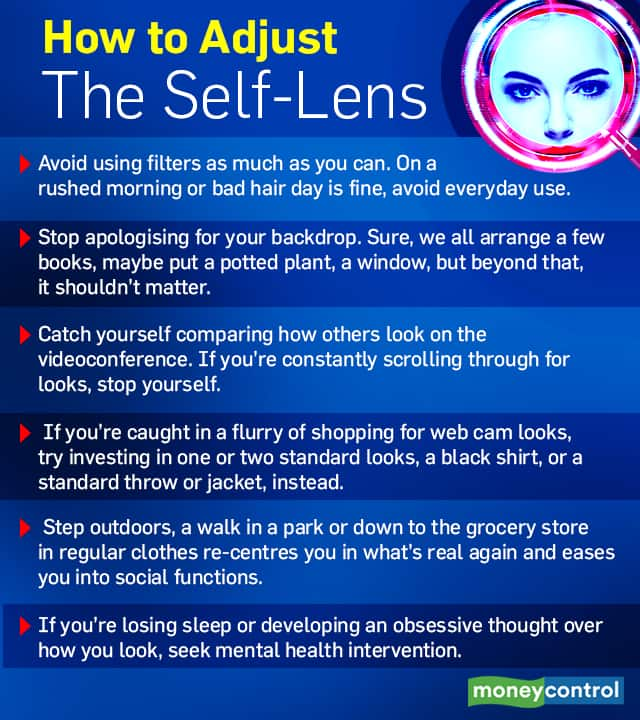



 Too much videoconferencing for over a year-and-a-half has put you on screen, spotlighted you when you speak, and relayed your image back to you relentlessly throughout the session, often throughout the day. At some point you may have caught sight of yourself slouching, adjusted your clothes or hair and told yourself you need to lose or gain weight, or change the angle at which the camera captures you. For some web session attendees, however, it’s become more than a passing thought. New research published in the International Journal of Women’s Dermatology (August 2021) suggests that the 3 trillion hours we spent online in 2020 are giving rise to anxiety about returning to offline activities that centre around personal appearance in about 70% of respondents and leading to body dysmorphic disorder.
Too much videoconferencing for over a year-and-a-half has put you on screen, spotlighted you when you speak, and relayed your image back to you relentlessly throughout the session, often throughout the day. At some point you may have caught sight of yourself slouching, adjusted your clothes or hair and told yourself you need to lose or gain weight, or change the angle at which the camera captures you. For some web session attendees, however, it’s become more than a passing thought. New research published in the International Journal of Women’s Dermatology (August 2021) suggests that the 3 trillion hours we spent online in 2020 are giving rise to anxiety about returning to offline activities that centre around personal appearance in about 70% of respondents and leading to body dysmorphic disorder.
What’s happening is that social media and videoconferencing offer you the use of filters to readily adjust your appearance or your background. This reinforces the belief that how you appear in real life, sans filter, is just not good enough. This is resulting in an erosion of self-esteem. Whereas earlier you may have used a filter once in a while to glam up an Insta-post or on Facebook in a more playful manner, now in the pandemic era, it has become your default mode for all routine or professional presentations. Along with normalising the filter, you are normalising apologising for how you and your environment really look.
This developing mindset has been particularly hard on teens and women, who have begun to consider cosmetic procedures they would not have earlier. The pandemic has already seen a rise in eating and sleep disorders, substance abuse, and an overall rise in anxiety and general mental health issues. This dysmorphia is increasing habits like purchasing or changing clothes, touching up the face with make-up, adjusting lighting and angles. While easing of restrictions to some extent helps those suffering as they resume social contact, begin to regain family and social support systems, with Zoom dysmorphia, the anxiety is likely to rise as people socialise again.
The most-cited areas of concern indicated were weight gain, skin discolouration, and wrinkles along with hair loss and acne. A whopping 82% surveyed always use filters.
In our day-to-day lives, we may check our clothes and how we come across in the mirror at the start of the day, but once we get busy, it’s likely we remain conscious of our appearance only briefly; when visiting the washroom, getting into a major meeting, or catching a glimpse of ourselves in a hallway mirror. What has changed with video conferencing is that the issue of how we look to others is now constantly in our face. If we already have an existing self-esteem issue with any part of our body, it can become exacerbated now.
Pride in how we look is an important part of self-esteem but concern or fear about it is for the most part proportional and fleeting. When does it become a problem, though? Some tell-tale signs are when it begins to interfere with your everyday functioning. If you’re focusing on your own image in the webcam throughout the conference, if you’re constantly needing to change clothes, refresh your make up, if you feel inadequate online no matter how well you dress, if you’re constantly comparing yourself to others on the conference, what they’re wearing and how they’re looking, and if it disturbs you greatly to go online without a filter, you may need to take a step back. It swells from the realm of a concern to an anxiety to a dysmorphia, depending on the degree to which it is intruding on your ability to function regularly, such as interrupting your sleep, causing you to take up extreme diets, or fasting, and pushing you to consider cosmetic procedures.
An effect of such poor self-image is that you may avoid going outdoors and meeting people. This presents as a social anxiety, feeling like you have nothing to wear, and no matter what you change into, you have gained or lost weight and pallor to the extent that you feel socially unpresentable. A rise in such inhibitions could be indicative of an overused filter.

Discover the latest Business News, Sensex, and Nifty updates. Obtain Personal Finance insights, tax queries, and expert opinions on Moneycontrol or download the Moneycontrol App to stay updated!
Find the best of Al News in one place, specially curated for you every weekend.
Stay on top of the latest tech trends and biggest startup news.